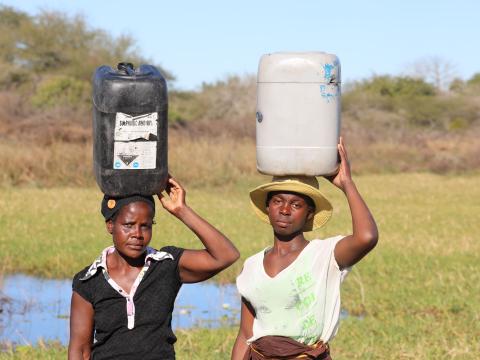From Dirty Ponds to Clean Dreams: A New Chapter for Families in Gaza Province, Mozambique

Water has no colour, no taste and no smell. Yet, in some areas of the Guijá and Mabalane districts, in the north of Gaza province, this is a utopian idea. The truth is, there are families, generation after generation, who have never known any other water than that collected from rain-filled ponds. The same water is shared with cattle, which drink from it and use it as their toilet, urinating and defecating in the same space.
We followed two women, mother and daughter, on their daily search for water. Two generations bound by the same legacy: the hardship caused by scarcity. The only available source is over 10 kilometres away and is unsafe. Eliza, the mother, and Cassilda, her daughter, spend nearly half their day on this task. That time, stolen from childhood and youth, cost Cassilda the chance to pursue her education. Now, at 19, she has gone no further than grade 7, and for her, that is almost a miracle in her community, where most girls never reach that far and are condemned to illiteracy.
“It’s hard to find time to study. Water is the priority for us, and women are the ones who suffer the most,” Cassilda said, her tone calm despite the weight of her words.
Leaving aside the scarcity for a moment, we turn to the water itself, or rather, the source. We arrived at the pond where, each day, around 100 families from this rural part of Guijá collect their water. Before we even stepped in, something caught our attention: a herd of cattle heading in the same direction. For us, it was surprising; for the locals, it was routine.
“We share the source with the animals. We have no other choice,” Eliza admitted, with a sigh of resignation.
At the edge of the pond, the reality was undeniable: animal waste and urine scattered along the perimeter, contaminating the water, altering its colour, smell and taste. This is the water Eliza, Cassilda and so many other families drink. There is neither time nor means to boil it, and the consequences are all too clear.
“After so many years drinking this water, you’d think we’d be immune… but no. Disease is still a daily struggle. Our children suffer constant diarrhoea,” Cassilda shared.
In an effort to change this reality, World Vision Mozambique is distributing the LifeStraw, a filter that makes contaminated water safe to drink by removing bacteria, parasites and microplastics, without the need for electricity or chemicals. Thanks to this device, families once condemned to drink unsafe water will, for the first time, have access to clean water , water without colour, without smell, without taste.
According to Abediningo Madingue, WASH Technician at World Vision:
“Each family will receive a filter capable of purifying up to five litres of water per hour, giving them access to clean, safe water.”
However, Madingue explained that there are conditions for receiving a LifeStraw: the family must have a latrine. In these areas, open defecation still occurs, which has a negative impact, particularly during the rainy season, when rainwater carries all the waste into the pond, creating serious risks for the community.
“Every family wants a LifeStraw, so everyone must ensure they have a toilet at home,” Madingue added.
We tested the LifeStraw with Eliza’s family. The water was filtered, and the difference was staggering, no one could quite believe it.
“This is incredible! We never imagined that one day we could drink water this clean,” said Marta, an elderly woman, her eyes lighting up with joy and astonishment as she watched the process.
During the test, we also examined what the filter had trapped. Among the sediment, we could see different types of larvae. Silence fell. Faces reflected shock and disbelief.
“Anyone who didn’t get sick, it was a miracle,” Cassilda murmured, visibly shaken.
It is expected that around 400 families living in the most water-insecure areas of Guijá and Mabalane districts will benefit from this vital tool, which can be used for at least five years.
This initiative not only purifies water, it purifies dreams, restores dignity, and opens the way for these communities to finally write a new story, one where thirst and disease are no longer an inheritance, and hope becomes the true legacy.